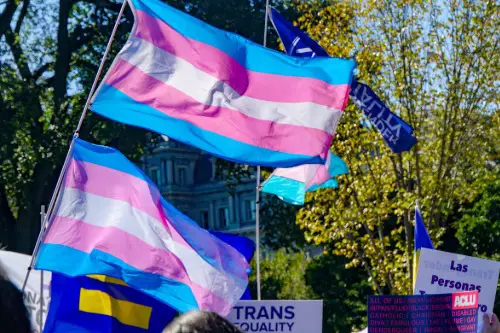1. Florida

Florida has been leading the charge when it comes to battles over both books and bathrooms. The state’s Parental Rights in Education law, dubbed the “Don’t Say Gay” bill by critics, limits discussion of sexual orientation and gender identity in younger grades. While the law doesn’t explicitly ban books, it’s triggered widespread removals of titles with LGBTQ+ themes from school libraries, according to Jeff Weiner of Axios. Many educators and librarians say they’re unclear about what’s allowed, so they’re erring on the side of caution—and censorship.
Meanwhile, bathroom access has also become a lightning rod issue. Florida passed a law requiring people to use public bathrooms that align with their gender assigned at birth in certain government buildings, including schools. Supporters say it’s about privacy, but trans advocates argue it’s discriminatory and dangerous. Lawsuits are already in progress, and the debate doesn’t look like it’ll cool down anytime soon.
2. Texas

Texas is in the thick of both book and bathroom fights, with several bills that have drawn national attention. A new law defines “man” and “woman” based on reproductive anatomy, potentially affecting everything from school policies to sports teams, Taylor Goldenstein of the Houson Chronicle explains. Although it doesn’t specifically mention bathrooms, LGBTQ+ groups say it opens the door to exclusionary practices. The law’s broad language has already prompted confusion and legal challenges.
On the book front, Texas continues to see heated debates in school districts over which titles should be pulled from shelves. Books with LGBTQ+ characters or racial justice themes are often the first to go. Some lawmakers even floated legislation against “furry” behavior in schools, though it’s unclear how real or widespread the phenomenon actually is. Critics argue it’s more about signaling than substance, but the cultural message is loud and clear.
3. Oklahoma

Oklahoma has taken a hard stance on school bathroom policies by passing Senate Bill 615. This law mandates that students use bathrooms that align with the gender assigned at birth listed on their birth certificate. The policy became tragically high-profile after the death of Nex Benedict, a nonbinary teen who was assaulted in a school bathroom, according to C. Mandler of NPR. Advocates point to the law as part of a broader climate of hostility toward LGBTQ+ students.
Oklahoma is also active in the book banning arena. The state allows parents to formally challenge any school library book they believe contains “sexualized content.” In practice, this often means titles with queer characters or frank discussions of gender and identity. As a result, some schools are clearing out books preemptively to avoid controversy.
4. Idaho

Idaho has drawn attention with a new law that lets parents sue libraries if their children access content deemed “harmful to minors.” The law doesn’t define “harmful” in clear terms, prompting librarians to err on the side of caution, according to Rebecca Boone of AP News. Some libraries have gone as far as restricting all minors from browsing sections unsupervised. Critics say it’s a way to silence marginalized voices without explicitly banning them.
The state’s attorney general has defended the law as protecting children, but others say it’s a dangerous overreach. Lawsuits are already underway from publishers and civil liberties groups. These organizations argue the law violates First Amendment rights and creates a chilling effect on public institutions. Librarians across the state report increased anxiety and confusion about how to comply.
5. Utah

Utah has implemented a unique law that lets a statewide ban take effect if just three school districts agree a book contains “sensitive material.” This process has already led to the banning of several titles, including classics and contemporary works dealing with sexuality and trauma. The law’s retroactive nature means books that were previously approved can now be removed. Authors and publishers are pushing back, saying it’s censorship under a different name.
Teachers and librarians have expressed concern about the lack of clear guidelines. Some say they’re afraid to introduce new books into classrooms at all. The ambiguity of what qualifies as “sensitive” leaves too much room for interpretation. And once a title is flagged, it can disappear from schools across the entire state, even if no local objections exist.
6. Arkansas

Arkansas passed a law that makes it a crime for librarians to provide material to minors that is considered “harmful.” This isn’t just a policy change—it carries the threat of jail time for people who don’t comply. The law also allows residents to challenge library books and have them moved to restricted sections. Unsurprisingly, many libraries are choosing to limit access just to be safe.
Opponents argue that this law effectively criminalizes librarians for doing their jobs. Legal challenges are already in motion, with civil rights groups claiming it infringes on free speech. The law’s vagueness has also led to confusion over what is actually permissible. Librarians say they’re caught in the crosshairs of a politically motivated culture war.
7. Indiana

Indiana now requires school libraries to publicly list every book in their collections and accept community complaints. Supporters argue it adds transparency and lets parents have a voice in education. But librarians and educators say it’s a backdoor way to encourage book bans. Once complaints roll in, books are often pulled temporarily—or permanently—without proper review.
Titles that focus on race, gender identity, or sexuality tend to be the most targeted. Some school districts are reporting dozens of challenges per month. The flood of paperwork has created a logistical nightmare for already overworked staff. Critics worry that the policy will lead to sanitized, one-dimensional library collections.
8. Louisiana

Louisiana has implemented a policy requiring parental permission before children can check out any book labeled as “sexually explicit.” While that may sound reasonable on the surface, the definition of “explicit” is incredibly broad. Books with LGBTQ+ themes, even if they’re age-appropriate and not graphic, often fall into this category. That effectively puts a lot of important literature behind a locked door.
Librarians say the process has led to censorship by default. Some parents are choosing to opt out entirely, even for books that aren’t controversial. Others worry their kids won’t have access to books that reflect their lives or experiences. The chilling effect is real, and it’s shifting how young people in Louisiana interact with literature.
9. Pennsylvania

In Pennsylvania, school districts have started pulling books from shelves pending review, often after parental complaints. These “temporary removals” sometimes stretch on for months, leaving students without access. Titles like Last Night at the Telegraph Club and Gender Queer have been placed on indefinite hold. There’s growing concern that delay tactics are just censorship in disguise.
Teachers and librarians say they’re getting little guidance from the state. With no formal process or timeline, decisions are being made arbitrarily. This gray area is especially frustrating for students who rely on school libraries for access to diverse viewpoints. Some districts are now pushing for clearer policies to protect both educators and readers.
10. Iowa

Iowa recently rolled back civil rights protections for transgender individuals, marking a historic and controversial move. This shift impacts everything from healthcare access to bathroom use in public schools. Trans students have reported feeling less safe and more isolated as a result. Civil rights groups say it sends a dangerous message to LGBTQ+ youth.
At the same time, Iowa has joined other states in scrutinizing school libraries. Books that explore gender identity or include LGBTQ+ characters are frequently targeted. Some school boards have even preemptively removed books to avoid backlash. Advocates worry that the combination of legal changes and cultural pressure is erasing queer identities from public spaces.
11. Minnesota

Minnesota is one of the few states actively pushing back against book bans. A new law prohibits removing library materials based solely on viewpoint or ideology. It also requires that professional librarians be involved in any challenge process. Supporters say it’s a much-needed safeguard in an increasingly hostile environment for educators.
Still, not everyone is on board. Some parental rights groups argue the law limits their influence on school content. There’s a growing divide between those advocating for intellectual freedom and those calling for more parental control. Minnesota’s stance could become a model—or a lightning rod—for other states.
12. Connecticut

Connecticut became a flashpoint in the book debate when a lawmaker read an explicit passage from a school library book aloud during a budget session. The goal was to highlight what he saw as inappropriate material available to minors. But the move backfired, drawing criticism for theatrics and taking content out of context. The episode reignited conversations about who decides what’s appropriate for kids.
Many educators argue that professional discretion—not political stunts—should guide library policies. Others say the incident shows how easily books can become political pawns. Since then, several districts have reviewed their library policies more closely. The debate continues over how to protect both children and free expression.
13. Illinois

Illinois took a bold step by passing a law that bans book bans—specifically prohibiting the removal of books from public libraries based on viewpoint. It’s the first law of its kind in the country and was celebrated by free speech advocates. The law emphasizes professional standards and allows challenges only when there’s legitimate cause, not just ideological disagreement. Supporters say it helps preserve intellectual diversity for future generations.
Not everyone agrees. Some parents and lawmakers claim the law undermines their role in shaping school content. The pushback hasn’t stopped Illinois from moving forward with implementation. As more states consider similar measures, Illinois may be setting the tone for a national shift in the book wars.


